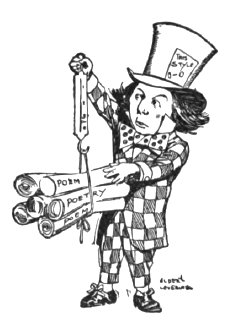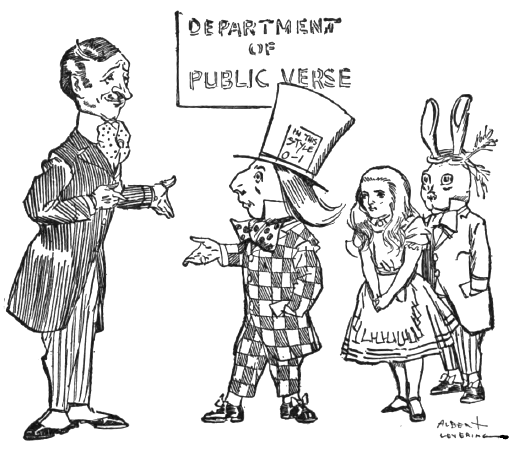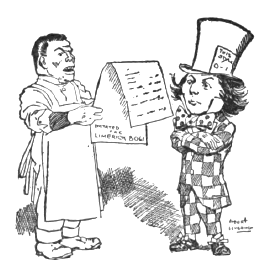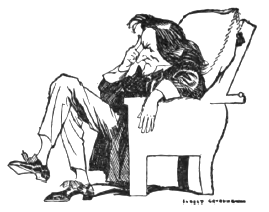| Web and Book design,
Copyright, Kellscraft Studio 1999-2017 (Return to Web Text-ures) |
 (HOME)
|
| CHAPTER VI THE DEPARTMENT OF PUBLIC VERSE "I think," said the Hatter, "that before we go any further we would better show Miss Alice our Municipal Poetry Factory. The whistle will blow very shortly and our Divine Afflatus Dynamo will shut down, so if she is to see that feature of our work now is the time to do it. "Yes," said the March Hare, "although the office is in some confusion owing to your recent Municipal Order Number 20,367 making Alabazam rhyme with Mulligatawney, and extending the number of lines in the municipal quatrains from four to twenty-three. The employees are finding considerable difficulty in making twenty-three-line quatrains and at least half the force have gone home suffering from acute attacks of brainstormitis."
 "LARGER MEASURE THAN WAS THE CUSTOM" "It'll do em good," laughed the Hatter. "A good brain storm may result in a few of them being struck. Come along, Miss Alice, and we'll show you our City Poets at work." "I don't think I understand," said Alice. "What is a city poet?" "He bears the same relation to Municipal Poetry that a White Wing bears to the Street Cleaning Department," explained the Hatter. "Two years ago the City took over all the Verse-making enterprises of Blunderland,appointed a Municipalaureat, otherwise a Commissioner of Public Verse, and started him along with a Department. He employs 16,743poets who provide all the poetry that is consumed by our people. It has resulted in great good for everybody. Poetry is cheaper by eight cents a line than it used to be, and, as you may have guessed from what the March Hare has just said, we give larger measure than was the custom under the private ownership of Pegasus. Quatrains have been increased from four lines to twenty-three, and the old stingy fourteen-line sonnet has been enlarged to fifty-four lines. We have also passed an ordinance requiring that poems shall say what they mean, which is a vast improvement on the old private control method where under anybody was allowed to write rhymes which nobody could understand — like that thing of Miss Arethusa Spink's, for instance, called Aspiration. Remember that?" "I don't think I ever heard it," said Alice. "Well it went this way," said the Hatter, and striking a graceful attitude here cited the following lines called: ASPIRATION By Arethusa Spink Down by the purple opalescent
sea,
Flung like a ribbon limp athwart the sky, A rose lay blooming on the restless lea, While sundry birds came chattering sweetly by. 'Twas then my soul that all too long had slept, Awoke from out its iridescent nap, [crept Down where the pink-cheeked crocus blossoms From out fair Nature's over-bounteous lap, And cried aloud "Alas! What hath betode? What dream is this that like the ambient brook Forbids the mind to face the solemn goad And know itself forsook!" The Hatter paused. "Well?" said Alice, slightly puzzled. "That's all there was to it," said the Hatter. "It was printed in one of our Magazines and within forty-eight hours the ambulance from the Insane Asylum was called out 737 times by people who had gone crazy trying to find out what it meant. It capped the climax. I called a special meeting of the Common Council to take the matter up purely as a matter of public health, and before I went to bed that night they had passed and I had signed an Act giving the control of the Verse Industry to the City and taking it out of the hands of irresponsible, unlicensed independent poets. "And a good job it was too," said the March Hare. "And you chose one of the best poets in town for the Commissioner, I suppose?"suggested Alice. "No we didn't," said the Hatter. "I didn't want any Moonshine in a City Department and no poet is a good business man. I picked out a very successful Haberdasher in the Sixth Ward for the delicate business of organising the Department, and he has done most excellent work. We found that just as a first class confectioner made a splendid manager of our gas plant, and a successful Hoki-Poki merchant had the required push to keep our trolley systems going, so the Haberdasher had the precise kind of genius to manage the poets. He won't stand any nonsense from them, and any poem that he can't understand is immediately thrown into the Civic Waste-Basket, taken to the Municipal Ferry and used for fuel to run the boats. I guess we burn nineteen tons of refuse verse a day, don't we, Alderman?" "About that — on the average," said the March Hare. "Sometimes it gets as high as twenty tons and occasionally it falls off to sixteen — but using these rejected manuscripts in place of coal has reduced the loss on the Ferry about thirty-eight dollars a year in real money." "How much is that in bonds?" asked Alice slyly. "O — let's see," said the Hatter, his face getting very red, "well — I should say on a basis of 43-1/3% to one, thirty-eight dollars would, come to about $97,347.83 in third debenture ten per cent. certificates,exclusive of the cost of printing, advertising, and the number we give away as sample copies." "Quite a saving," said Alice. "Yes,"
said the Hatter. "We save all we can. Economy in real money is our
watchword. We never spend a cent where a bond will serve the purpose."  "GREETED BY THE COMMISSIONER, THE HABERDASHER" By this time Alice and her hosts had reached the building occupied by the Department of Public Verse, and upon entering its spacious doorway the party were greeted by the Commissioner, the Haberdasher, to whom Alice was promptly introduced. He reminded her very forcibly of her old acquaintance Bill the Lizard, but she was not sure enough on this point to recall their previous meeting when she had so tactlessly kicked him up through the chimney flue of the Wonderland Cottage. "Well, Mr. Commissioner," said the Hatter, "how are you getting along?" "Pretty well, Mr. Mayor," replied the Commissioner. "We've just finished thesix line couplet for the new Chewing Gum Bonds." "Good," said the Hatter. "How does it go?" "Rather neatly I think," said the Commissioner, and he read the following:
We promise to pay
And if we haven't,
pray don't despond,This bond some day If of the stuff We've got enough. For we'll pay it off with another bond.
"Fine," said the Hatter. "You strike a very lofty note in that. And how do the new Limericks work?" "We've finished number 3907 of series XZV," said the Commissioner. "I'll send for Wiggins who wrote it and let him read it to you himself." A pressure of an electric button brought the smiling Wiggins into the office. "Wiggins, the Mayor would like to hear that new Limerick of yours," said the Commissioner.  "IT RUNS THIS WAY, YOUR HONOUR" "Thanky sir," said Wiggins. "It runs this way, your honour. "There was an old lady named
Jane
Who sat on a fence at Schoharie. A rooster came by And crew like the deuce But Jane never scared for a cent." "That's great," said the Hatter. "Don't you think so, Miss Alice?" "Why yes," said Alice, "but — does it rhyme?" "Perfectly," replied the Hatter, "that is, under our system. When we organised this Department to facilitate business and avoid the waste of time looking for rhymes we legalised such rhymes as Schoharie and cent and by and deuce. By that act we found that where one man could only turn out 800 Limericks a day under the old system, any able-bodied-poet can write 3,000 in the same number of hours. That's very good, Wiggins," he added turning to the workman. "I shall recommend the Commissioner to promote you to an Inspectorship in the Sonnet works." "Thanky sir," said the Poet, as he blushingly bowed himself out.  "OUR THINKING DEPARTMENT" "Here," said the Commissioner, opening a door leading into a long, darkenedchamber, "here, young lady, is our Thinking Department." Alice passed into the darkness and dimly made out a half a hundred long-haired individuals sitting in comfortable Morris chairs, their forefingers pressed hard against their brows and their eyes gazing fixedly out into space. "These men and women think the thoughts which our municipal poetry is designed toexpress," the Commissioner continued. "A thought once seized by any one of them is written down upon a pad, and then taken into this next room where it is classified and assigned to the line cutters who turn out the first draft in the rough. Then when this is done it is sent to the rhyming room where the lines are made to end in rhymes, and finally it goes to the Polishing room where the poemis made ready for publication." "It's a wonderful system," said the Hatter. "It not only improves the quality of our poetry, but in campaign times it is a great help, since we control absolutely all the campaign poetry. When I run for mayor next fall to succeed myself there won't be a single poem written on the other side." "That ought to be a great help," said Alice. "Yes," said the Hatter. "It will be. Every employee in this Department will not only vote for me but will work for me as well. Same way in the gas plant and the trolley — in fact in all the City Departments. It is only another evidence of the very great value of Municipal Ownership. It is uncertainty in political times that upsets business, but with the Municipality in control of all these Departments from Gas to Poetry there is no uncertainty about who will win, so that business is not unsettled by it." "Wonderful," said Alice. "By the way, Mr. Commissioner, you'd better start the Rhyming Bureau on the search for rhymes to Hatter at once," said, the Mayor. "We don't want to be caught unprepared at the last minute." "The list is being compiled now," replied the Commissioner. "We already have,Matter, Batter, Tatter, Smatter Patter, Ratter, Spatter and Scatter." "Fine!" chortled the Hatter. "Don't forget Chatter," put in Alice. "Thank you — I'll make a note of it," said the Commissioner. "And Snatter," growled the March Hare gloomily, who evidently felt that somebody ought to be looking for rhymes to March Hare as well. "What does snatter mean?" demanded the Hatter frowning. "It's a corrupt form for snatcher," retorted the March Hare. "One who snatches everything he can lay his hands on, without regard to whether it's his by divine right or not. I guess they can use it in poems calling attention to your Civic Virtues." "Except by unanimous vote of the Common Council over my veto Snatter stays out of the Municipal Vocabulary," returned the Hatter coldly. "Your own confession that it is corrupt is enough to condemn it with me." "I wouldn't use batter either, Mr. Mayor," said the Commissioner. "Batter is dough and we haven't got any worth mentioning." "It is also to whack, slam, bang, bust, smack," retorted the Hatter, "so your recommendation is not accepted. Seems to me I can almost hear the campaign clubs singing as they march: "O the noble, noble Hatter,
Ain't he grand! How his enemies do scatter Thro the land! How his foemen he doth batter With their idle gloomy chatter On this Muni — cipal Matter Beats the band!" "O Gee!" ejaculated the March Hare. "Do you call that poetry?" "Sir, I call it truth," returned the Hatter, "and poetry is truth just as art is truth, and if you don't believe it all you've got to do is to try and run against me next fall on that issue. I'll beat you to a stand-still." "Of course you will," sighed the March Hare. "But you wouldn't but forthat last ordinance you jammed through while I was off on my vacation." "What was that?" demanded the Hatter. "Giving the Election Commission absolute control over the votes, and then appointing yourself Election Commissioner ex-officio," said the March Hare. "I don't believe that Municipal Control of the ballot is constitutional." "Well, it will be constitutional," said the Hatter drily. "When?" demanded the March Hare. "When we secure Municipal Control of the Constitution," said the Hatter. "I'll make it Constitutional if I have to rewrite the whole blessed Constitution myself." Whereupon the Hatter walked majestically forth into the street once more, and Alice and the March Hare together with the White Knight followed meekly in his train. |